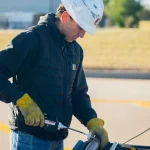When it comes to managing commercial paving projects, it’s not enough to find the lowest quote. Protecting your property, investment, and timeline starts with hiring a qualified commercial asphalt contractor in AZ—and that means verifying their licensing, insurance, and certifications.
This detailed checklist will help you vet potential contractors before you sign any agreement. We’ll also explore real-world examples of red flags and how to spot them early.
✅ Arizona Registrar of Contractors (ROC) License
In Arizona, commercial paving contractors must hold a valid license from the Arizona Registrar of Contractors (ROC). This license confirms they have met state requirements for skill, experience, and financial responsibility.
What to Do:
-
Ask for the contractor’s ROC number
-
Use the official ROC license search tool to verify it
-
Confirm they are classified under C-14 (Asphalt and Paving)
-
Look for disciplinary actions, suspensions, or complaints
Why it Matters:
Hiring an unlicensed contractor can result in incomplete or substandard work—and you’ll have little legal recourse if problems arise. Some property managers have learned this the hard way, especially when unlicensed crews disappear mid-project or cause damage not covered by insurance.
✅ General Liability Insurance
This protects you from claims if the contractor damages your property or someone gets hurt during the job.
Checklist:
-
Confirm a minimum of $1 million coverage per occurrence
-
Request a Certificate of Insurance (COI) listing your property as “additionally insured”
Case Example:
One Arizona business owner shared that their paving contractor accidentally backed a dump truck into a storefront. Because the contractor carried proper liability insurance, the business was reimbursed promptly. Without it, the damages—over $30,000—would have fallen on the property owner.
✅ Workers’ Compensation Coverage
This insurance covers medical costs if a crew member is injured on-site. If your contractor doesn’t have workers’ comp, you may be held responsible.
Checklist:
-
Ask to see proof of coverage
-
Verify it’s active and current through the insurance provider if necessary
✅ Bonding
Bonded contractors are backed by a third party who guarantees that the job will be completed—and that subcontractors will be paid.
When to Require It:
-
On large-scale or multi-phase projects
-
If your company requires bonding as part of internal risk management
Benefits:
A performance bond ensures that if the contractor walks off the job, you’re financially covered to hire someone else and complete the work.
✅ Manufacturer Certifications (Optional but Valuable)
Some manufacturers only honor their product warranties when materials are installed by certified contractors.
What to Look For:
-
Certifications from brands like SealMaster, Crafco, or GemSeal
-
Proof of training in specific application methods
Why it Matters:
Improper material application can lead to premature failure. For example, a commercial sealant not applied under the correct conditions (humidity, temperature) may peel within months. Certified contractors know how to avoid these costly mistakes.
✅ OSHA Compliance and Jobsite Safety
Reputable paving crews follow OSHA standards and prioritize safety. A contractor’s safety record speaks volumes about how they manage their jobsite—and protect your liability.
Checklist:
-
Ask if supervisors have OSHA 10 or OSHA 30 training
-
Confirm regular toolbox talks or safety meetings
-
Inquire about PPE (personal protective equipment) usage and signage
✅ Local Permits and ADA Compliance
Projects that alter parking lots, curbs, or walkways may require municipal permits and ADA compliance for slope, width, and striping.
Your Contractor Should:
-
Pull any required city or county permits
-
Use ADA-compliant striping and signage
-
Account for drainage slopes and accessibility ramps
Neglecting ADA rules not only puts users at risk—it can result in fines or legal action against your business.
🚨 Red Flags to Watch Out For (with Real-World Context)
Even when a contractor claims to have “years of experience,” these red flags should raise concern:
❌ No Written Contract or Vague Estimates
Scenario:
A retail plaza owner accepted a verbal estimate for milling and repaving a 50,000 sq. ft. lot. The contractor later increased the price by 35%, claiming “additional work” was needed. There was no written agreement, so the owner had little recourse.
Solution:
Insist on a detailed contract outlining scope, materials, timeline, and payment terms.
❌ Requests for Large Upfront Deposits
While a small deposit is reasonable, large prepayments are a red flag—especially if they exceed 25% of the project cost.
Why?
Some disreputable contractors collect deposits and either ghost clients or delay the job indefinitely.
What to Do:
-
Pay in milestones based on progress
-
Use payment methods that leave a paper trail (no cash)
❌ Refusal to Share Insurance or License Documents
Any hesitation or excuses about showing proper documentation is a major warning sign.
What This Might Mean:
-
The contractor is unlicensed or underinsured
-
They’re subcontracting the job to a third party without disclosure
❌ Poor Online Reviews or No Digital Presence
A lack of web presence—or consistently bad reviews—should not be ignored.
Case Use:
One industrial park in Phoenix discovered their contractor had multiple 1-star reviews for unfinished jobs and aggressive behavior. Checking ahead could have prevented weeks of lost time and legal hassle.
Final Thoughts
Hiring a commercial asphalt contractor in AZ is an investment in your property’s function, safety, and visual appeal. The checklist above empowers you to ask the right questions—and avoid the costly pitfalls of working with unqualified or untrustworthy contractors.
A legitimate contractor will never shy away from transparency. When you verify licenses, insurance, and certifications, you’re not just protecting your property—you’re setting your project up for success.






